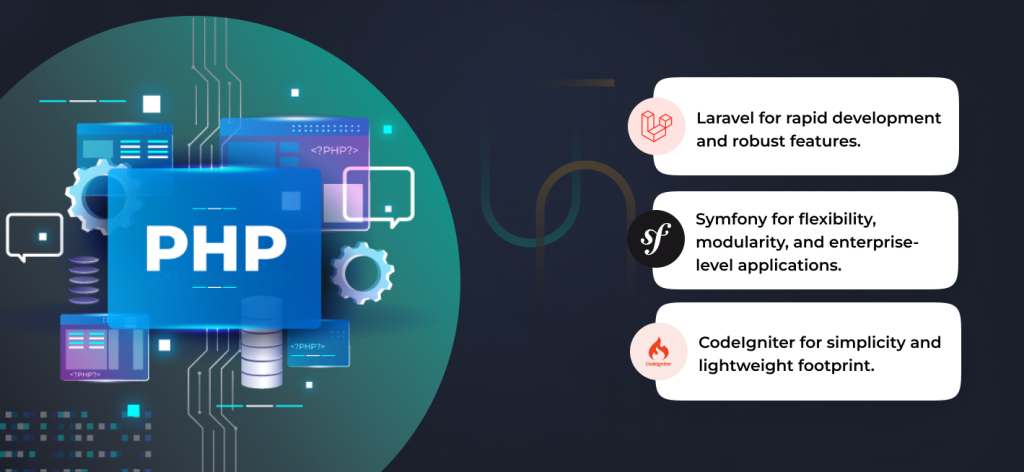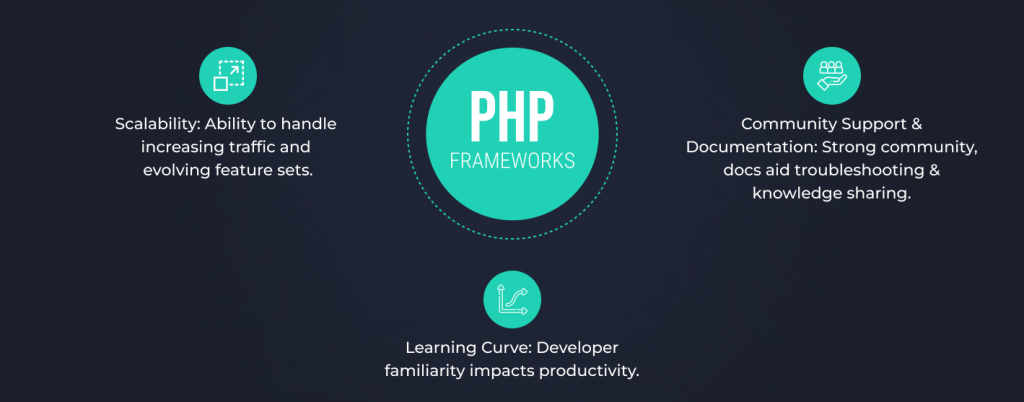PHP has been at the forefront when it comes to technologies in the world of software development. According to a 2020 survey conducted by W3Techs, PHP is used by 76.7% of all websites with a known server-side programming language. Understanding the frameworks of PHP is crucial for anyone venturing into web development. With a plethora of options available, choosing the right framework for your project can be daunting. Be it the accessibility or flexibility of Laravel, the performance-rich Symfony, or the lightweight CodeIgniter, each PHP framework has its own strengths and best-use scenarios. Understanding these differences is vital to making a decision that aligns with your business goals and requirements.
In this blog, we’ll dive into the complexities surrounding PHP frameworks and provide clarity on selecting the perfect fit for your specific project requirements. With a closer look at the distinctive features, performance, scalability, and community support of popular frameworks of PHP, you’ll gain valuable insights that will steer you towards the most suitable choice for your development needs.
Selecting the right PHP framework for your project can be overwhelming, but with the right guidance, you can streamline your decision-making process and focus on your development journey with confidence. Read on till the end of this blog to explore the different frameworks of PHP to make an informed choice that aligns with your project goals.
Understanding The Frameworks Of PHP
PHP frameworks form the backbone of web development, providing a structured foundation for building robust and scalable web applications. These frameworks offer a set of pre-built components, libraries, and tools that streamline the development process and promote code reusability. By adhering to the MVC (Model-View-Controller) architecture, PHP frameworks facilitate organized code structure, separation of concerns, and efficient maintenance of web applications.
The primary goal of PHP frameworks is to expedite the development process by reducing the need for repetitive coding tasks and enforcing best practices. Additionally, they enhance security measures, improve code readability, and enable seamless integration with third-party libraries and APIs. Understanding the fundamental role of PHP frameworks is pivotal in grasping their significance in web development and the impact they have on project outcomes.
How To Choose The Right PHP Framework?
Selecting the appropriate PHP framework is a critical decision that significantly influences the success of a web development project. Each framework comes with its own set of features, performance benchmarks, and community support, making it essential to align these attributes with the specific requirements and objectives of the project. A well-suited framework can expedite development, enhance maintainability, and ensure scalability, whereas an ill-fitting framework may lead to inefficiencies and limitations.
Furthermore, the choice of framework directly impacts the developer’s productivity, as familiarity with the framework’s conventions and practices can streamline the implementation of features and functionalities. By carefully evaluating the suitability of PHP frameworks based on project scope, complexity, and long-term maintenance, developers can make informed decisions that pave the way for successful project execution.
The Most Popular Frameworks Of PHP

The PHP ecosystem boasts a diverse array of frameworks, each tailored to cater to different development needs and preferences. Among the plethora of options available, Laravel, Symfony, and CodeIgniter stand out as prominent choices that have garnered widespread acclaim within the developer community. These frameworks offer unique features, performance optimizations, and extensive documentation, catering to a wide spectrum of web development requirements.
Laravel, known for its expressive syntax and developer-friendly approach, excels in rapid application development, robust feature set, and seamless integration with third-party tools. Symfony, revered for its flexibility and modularity, empowers developers to build complex enterprise-level applications with ease, leveraging its extensive library of components and configuration options. On the other hand, CodeIgniter, with its lightweight footprint and minimal configuration requirements, remains a popular choice for small to mid-sized projects, emphasizing simplicity and ease of use.
Framework Comparison: Laravel Vs Symfony Vs CodeIgniter

When understanding the frameworks of PHP, a comprehensive comparison of their features, performance metrics, and suitability for different project scenarios is imperative. Laravel, known for its elegant syntax and comprehensive ecosystem, excels in powering modern web applications and RESTful APIs, offering built-in support for features like authentication, caching, and database migrations. Its robust ORM (Object-Relational Mapping) capabilities and expressive routing mechanisms make it an ideal choice for projects requiring rapid development and scalability.
On the other hand, Symfony’s emphasis on modularity, configurability, and extensibility positions it as a top contender for large-scale enterprise applications and complex web systems. Leveraging its reusable components, dependency injection container, and event-driven architecture, Symfony empowers developers to architect highly customizable and maintainable solutions, making it a preferred framework for projects with intricate business logic and diverse integration requirements.
Meanwhile, CodeIgniter’s lightweight footprint, straightforward setup, and minimalistic approach make it an ideal technology for small to medium-sized projects that prioritize simplicity, performance, and ease of learning. Despite its minimalistic nature, CodeIgniter offers essential features such as database abstraction, form validation, and error handling, catering to the needs of developers seeking a lean yet capable framework for your projects.
Factors To Consider When Choosing A PHP Framework

When embarking on the journey of selecting a PHP framework for a web development project, several key factors warrant careful consideration to ensure compatibility with project requirements and long-term viability. The scalability of the framework, encompassing its ability to handle increasing traffic and evolving feature sets, underscores the need for a framework that can accommodate future growth without compromising performance or maintainability.
Moreover, evaluating the learning curve associated with each framework is pivotal, as developers’ familiarity and proficiency with the chosen framework directly impact productivity and code quality. Community support and documentation also play a vital role in the decision-making process, as robust community backing and comprehensive documentation contribute to the ease of troubleshooting, knowledge sharing, and continuous improvement of the development process.
Assessing Project Requirements For Framework Selection
Aligning the unique demands of a web development project with the capabilities and features offered by different PHP frameworks is essential for making an informed decision. Projects with stringent time constraints and a focus on rapid prototyping and deployment may benefit from the streamlined workflows and extensive feature set of Laravel, which facilitates quick iterations and efficient development cycles.
Conversely, projects characterized by complex business logic, diverse integration points, and a need for high configurability and modularity may find Symfony to be an apt choice, empowering developers to architect scalable and maintainable solutions tailored to intricate requirements. For projects where simplicity, performance, and minimal setup overhead take precedence, CodeIgniter emerges as a compelling option, offering a lightweight yet capable framework for building agile and efficient web applications.
Evaluating performance and scalability of PHP frameworks
Performance and scalability are pivotal considerations in the selection of a PHP framework, especially for projects expected to handle high traffic volumes and accommodate future growth. Laravel’s robust caching mechanisms, optimized database query builder, and support for horizontal scaling make it well-suited for projects aiming to achieve optimal performance and seamless scalability as user base and feature complexity expand.
Similarly, Symfony’s emphasis on performance optimizations, efficient resource utilization, and configurable caching strategies positions it as a competitive choice for projects requiring high throughput and responsiveness. Leveraging its flexible caching layers, optimized autoloading, and efficient request processing, Symfony empowers developers to craft web applications that exhibit superior performance and scalability, capable of meeting evolving demands with ease.
On the other hand, CodeIgniter’s lightweight footprint and minimal overhead contribute to its efficient resource utilization and swift request processing, making it an ideal framework for projects that prioritize raw performance and agility. With its streamlined architecture and emphasis on simplicity, CodeIgniter ensures that web applications exhibit responsive behaviour and optimal performance, even under demanding usage scenarios.
Community Support & Documentation For PHP Frameworks
The significance of robust community support and comprehensive documentation cannot be overstated when evaluating PHP frameworks for a development project. A thriving community fosters knowledge sharing, issue resolution, and continuous improvement, enabling developers to leverage community-contributed resources, libraries, and best practices that enhance the development process and address challenges effectively.
Laravel’s vibrant community, characterized by active forums, extensive documentation, and a rich ecosystem of third-party packages, offers developers a wealth of resources and support avenues for addressing queries, sharing insights, and staying abreast of the latest developments in the Laravel ecosystem. This robust community backing contributes to the framework’s continuous evolution, ensuring that developers have access to a diverse array of resources and solutions to bolster their projects.
Similarly, Symfony’s expansive community, bolstered by a vast repository of reusable components, comprehensive documentation, and a culture of knowledge exchange, provides developers with a robust support network and a treasure trove of resources for building scalable and maintainable applications. The community-driven ethos of Symfony fosters collaborative problem-solving, fosters innovation, and empowers developers to harness the full potential of the framework in their projects.
CodeIgniter, despite its minimalist nature, benefits from a dedicated community that actively contributes to its growth and enhancement. With a focus on user-friendly documentation, accessible forums, and a repository of user-contributed extensions, CodeIgniter’s community support facilitates a conducive environment for developers to seek guidance, share experiences, and leverage the collective wisdom of the community in overcoming challenges and optimizing their development workflows.
Choosing The Right PHP Framework For Your Project
Armed with a comprehensive understanding of the distinctive features, performance benchmarks, and community backing of popular PHP frameworks, the process of selecting the right framework for your project becomes a deliberate and informed endeavour. By aligning the specific requirements, scalability expectations, and development preferences of your project with the strengths and best-use scenarios of Laravel, Symfony, and CodeIgniter, you can make a well-informed decision that lays the foundation for a successful web development journey.
Consider the unique attributes of each framework in relation to your project’s scope, complexity, and long-term vision. Evaluate the performance optimizations, scalability strategies, and community support mechanisms that resonate with your development ethos and project goals. By fostering a meticulous approach to framework selection, you can empower your development team to leverage the chosen framework’s strengths, mitigate its limitations, and embark on a development trajectory marked by efficiency, scalability, and code maintainability.
Conclusion
Demystifying PHP frameworks is an essential step in the journey of web development, enabling developers to make informed decisions that resonate with their project objectives and development ethos. The nuanced understanding of popular PHP frameworks, such as Laravel, Symfony, and CodeIgniter, equips developers with the insights needed to align framework selection with project requirements, scalability expectations, and long-term viability.
By navigating the landscape of PHP frameworks with a discerning eye, developers can harness the unique strengths of each framework to streamline development workflows, expedite project execution, and ensure scalability and maintainability. The choice of the right PHP framework transcends mere technical preferences, embodying a strategic decision that paves the way for the successful realization of web applications that resonate with user expectations and business objectives.
Venture on your framework selection journey with confidence, leveraging the insights garnered from this exploration to chart a development trajectory that aligns with your project’s vision and objectives. Unleash the potential of PHP frameworks to propel your web development endeavours towards success, embracing the power of informed decision-making and strategic framework selection as catalysts for building impactful and scalable web applications. Make the right choice. Choose the perfect PHP framework for your project. Your development journey awaits, adorned with the promise of efficiency, scalability, and code maintainability. Let the selection of the right PHP framework be the cornerstone of your web development odyssey, guiding you towards the realization of web applications that resonate with user expectations and stand the test of time.
Choose Aipxperts As Your PHP Development Partner
Aipxperts is a leading web development company that can help you develop your project with the right PHP framework. We have a team of experienced and skilled developers who can create a custom application that meets all of your needs and requirements.
Here are some of the reasons why you should choose Aipxperts:
- We have a proven track record of success. We have successfully developed and delivered a wide range of web applications for clients of all sizes.
- We have a deep understanding of PHP frameworks. Our team is experts in all major PHP frameworks, including Laravel, Symfony, CodeIgniter, Yii, and Phalcon.
- We are committed to quality. We use a rigorous development process that ensures your application is of the highest quality.
- We are responsive and reliable. We are always available to answer your questions and provide support.
- We are cost-effective. We offer competitive rates and pricing packages to suit your budget.
Contact us today to learn more about how Aipxperts can help you develop your project using frameworks of PHP.
Choosing the Right PHP Framework for Your Project | Hire experienced PHP developers from Aipxperts. Contact us for project estimates and enjoy a 15-day risk-free trial period.











